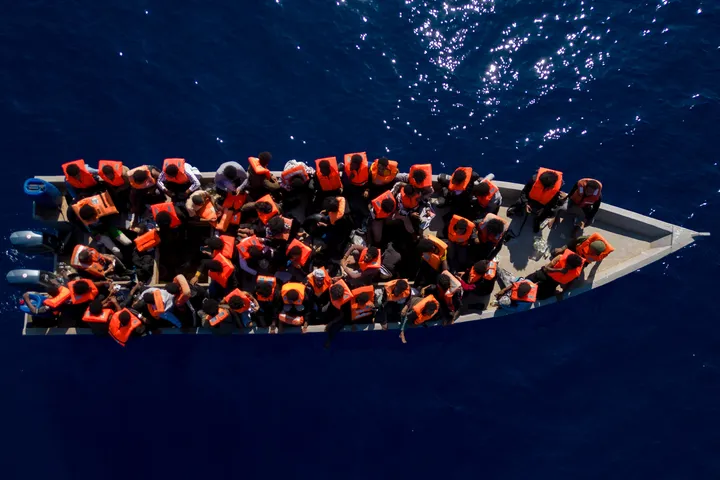HERAT, Afghanistan — For the last 13 years, Khala Noorjahan has travelled over 20 kilometres every day to the edge of Afghanistan, to work in a small makeshift clinic that lies in western Herat province, on the border the country shares with Iran. She is not a doctor or a nurse, but trained years ago as a midwife — a life-saving skill she learned along the way. She now assists a doctor and two nurses at Zero Point, a neutral space between Iran and Afghanistan where the return of Afghan refugees is facilitated.
Every day, she watches hundreds of Afghan men, women and children get dropped off by the Iranian authorities at the gates of Zero Point. Some of them are returning voluntarily, but most of them are undocumented refugees who are deported by Iran and pushed to Zero Point.
“We get all kinds of patients with all kinds of sorrows. I sometimes have to physically bring the patients left at Zero Point to the clinic,” Noorjahan, who's in her late 50s, told TRT World. “A Kandahari woman was sexually abused in Iran last year. She came to us and started crying. She was raped by four people. She was with her husband and two kids.”
Noorjahan and her colleagues provide treatment for dozens of men and women who accuse Iranian authorities of torture and other forms of human rights abuse.
Their makeshift health clinic has a capacity to take up 30 cases each day. Its manager Dr Noor Ahmad Mohammadi gave this reporter a tour of the clinic, which is made of mud, bricks and some wooden planks. The facility is divided into four rooms: the outpatient department, a midwives' room, a vaccination centre and Mohammadi's office, where he examines the health of the refugees.
The new arrivals are sent to the Refugee Reception Centre, a facility built by the Norwegian Refugee Council (NRC) and operated by many international and Afghan organisations.
Despite modest appearances, Mohammadi and his team deal with some of the worst cases of ailing, abused, and untreated refugees from Iran, many of whom are being forcefully sent to Afghanistan. For many Afghans, the neighbouring country has been a shelter for the displaced who fled their homes during the four decades of war. It is also the most convenient route for those attempting to reach Europe.
According to the International Organization for Migration, Iran hosts approximately 950,000 documented Afghan refugees. At least another 1.5-2 million undocumented Afghan migrants are currently in Iran. They tend to face forceful deportations. In 2019 alone, nearly 273,700 Afghans were deported from Iran. Many of them, faced with hardships and difficult circumstances, were treated at Mohammadi’s clinic at Zero Point.
“Our countries are not always on the best terms and there are a lot of political disagreements that puts these refugees in a difficult situation as they get caught in political crossfire,” Mohammadi said. “I wear this white coat. My job is to treat them and not judge the politics that led to their circumstances. It breaks my heart to see their pain,” he said.
While talking to TRT World, he took breaks to attend to the newly arriving patients. Just days before, he treated a 14-year-old boy who was shot in the leg while trying to escape the Iranian authorities to avoid deportation. “We provided him first aid, and rushed him to the hospital about nine kilometres away,” he said. “I have attended all kinds of cases; victims of torture, bullet injuries, physical abuses and sexual abuses.”
Mohammadi was himself a refugee in Iran. About 14 years ago, as he returned to Afghanistan through the Zero Point, he started working at the clinic a volunteer. “We had little resources and nearly no staff. I built this place from scratch because I love what I get to do here. I can make a difference,” he said.
For the first 16 months, he worked for free. “As someone who has lived in the very situation as these people, I can relate to their problems better than anyone else. I am able to empathise with them and help them in a more personal way,” he said.
While they have come a long way, the clinic is still underfunded, and in need of resources and additional staff, especially to work with women and children. In fact, owing to the location of the Refugee Reception Centre, close to the border and away from the city, only a handful of women work there, of which three, including Noorjahan, are with the clinic.
But despite little financial reward, Mohammadi and his small staff remain committed to providing the best healthcare possible in the most dire circumstances, working long hours, and at times unpaid. “When I am reminded of all the injustice and pain they suffered, it motivates me to work harder. I cry for the victims I see everyday,” he said, choking back tears.
His colleague Noorjahan is also intimately familiar with refugee life, as she has been a war refugee in Iran herself at one point in time in her life.
“It’s hard to do this job, to watch our people, especially the women, in distress,” she said. “Having been a refugee, I understand their pain. I know what the ground reality is in Iran and I can feel their suffering as I have lived through some of it myself.”























